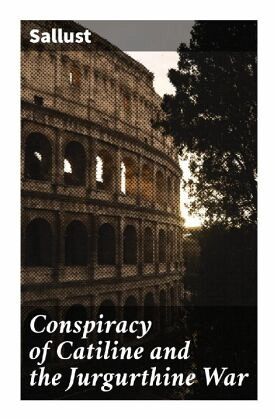
Conspiracy of Catiline and the Jurgurthine War
Versandkostenfrei!
Versandfertig in 6-10 Tagen
8,99 €
inkl. MwSt.
Weitere Ausgaben:

PAYBACK Punkte
4 °P sammeln!
In "Conspiracy of Catiline and the Jugurthine War," Sallust masterfully weaves a narrative that delves into the political machinations of late Republican Rome. Written in a concise and vigorous prose style, Sallust's accounts highlight the moral decay of Roman society through the lens of two critical historical events. His vivid depictions of the conspiracies led by Lucius Sergius Catilina and the prolonged conflict against Jugurtha illuminate themes of corruption and the struggle for power, while stylistically reflecting the influence of earlier historians yet paving the way for future narrat...
In "Conspiracy of Catiline and the Jugurthine War," Sallust masterfully weaves a narrative that delves into the political machinations of late Republican Rome. Written in a concise and vigorous prose style, Sallust's accounts highlight the moral decay of Roman society through the lens of two critical historical events. His vivid depictions of the conspiracies led by Lucius Sergius Catilina and the prolonged conflict against Jugurtha illuminate themes of corruption and the struggle for power, while stylistically reflecting the influence of earlier historians yet paving the way for future narrative forms that emphasize character and moral inquiry. Sallust, a Roman historian and politician, experienced the turbulent politics and warfare of his time firsthand, which undoubtedly shaped his perspective and his commitment to presenting history not merely as a sequence of events but as a reflection of moral truths. His own political career, marred by controversy and aligned with the reformist cause of Julius Caesar, informs his critical stance on the decay of the Republic, offering readers a unique insight into the complexities of power and ethics. This book is an essential read for anyone seeking to understand the foundational conflicts that shaped Roman history and, by extension, Western civilization. Sallust's sharp critiques and engaging style render these historical events timeless, making the work not only a crucial historical document but also a compelling narrative that resonates with contemporary readers interested in the nature of power and accountability.













